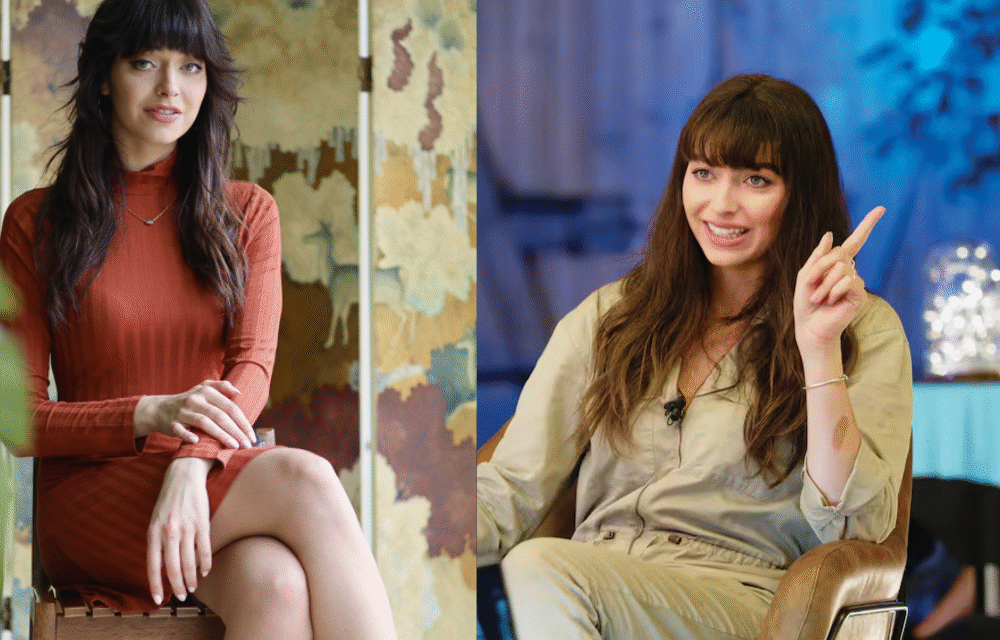Introduction
Some artists are born into creativity. Others grow into it like a second skin. Rosalie Bonenfant is both.
Born on August 26, 1996, in Montreal, Rosalie was surrounded by cameras, lights, and creative energy from a young age. As the daughter of actress and TV host Mélanie Maynard, it’s easy to assume she was destined for a career in the arts — but what sets her apart is not just her lineage. It’s her unmistakable voice, her raw honesty, and her fearless willingness to step outside the boundaries of genre, format, and comfort zones.
Over the years, Rosalie has worn many hats: actress, radio host, columnist, novelist, and, most recently, a screen star. But underneath it all is a person on a deep, personal journey — of growing up, figuring things out, and turning experience into art.
Early Exposure to the Arts
Rosalie’s first steps into the world of performance weren’t forced or overly polished — they were curious, joyful, and playful. She began performing in local productions and television shows as a child, soaking in the atmosphere of sets and scripts. But she didn’t rely solely on her environment — she worked at it.
She trained in theatre, jazz dance, singing, and even circus arts. By the time she was a teenager, Rosalie already had a strong foundation in performing and a hunger to experiment with different forms of storytelling.
Her breakout moment came with the hugely popular Quebec series Les Parents, where she played Sarah. The show ran for years and gave Rosalie a platform — but instead of staying comfortable in the role of “TV actress,” she did something more interesting: she left the spotlight, momentarily, to find her voice.
Growing Pains and Reinvention
Rosalie has often described herself as someone who thrives under pressure and reinvention. After her success on TV, she didn’t jump straight into more acting gigs. Instead, she began to write.
In 2018, she published her first book — La fois où j’ai écrit un livre — a collection of short, funny, touching, sometimes brutally honest columns and reflections. It was witty, charming, self-aware, and refreshingly unfiltered — much like Rosalie herself. Each piece in the book carried a little emoji or “mood icon” to capture its emotional tone, a playful way to connect with readers without losing depth.
Through her work in magazines like Urbania and her podcast/radio appearances on ÉNERGIE and Rouge FM, Rosalie began to establish herself as not just an actress, but a thoughtful commentator on culture, emotion, and growing up in a hyper-connected world.
The Screen Star Emerges
In 2022, Rosalie took on what would become one of her most transformative roles yet: the title character in Inès, a feature film directed by Renée Beaulieu.
The film follows a young woman navigating grief, emotional trauma, and substance use. It’s not a comfortable film — and that’s exactly why Rosalie took the role. For the first time, she stepped into a deeply dramatic part that required not just skill, but complete emotional surrender. Her performance was intimate and vulnerable, sometimes physically demanding, and stripped of vanity.
She later admitted in interviews that she had to leave all her fears behind on set — especially the fear of judgment. “If I held back, even a little, it wouldn’t be real,” she said. And that sums up so much of her journey: she refuses to hold back.
The Writer Within
Alongside her acting work, Rosalie continues to write — not just fiction, but personal essays and commentary that tackle big topics with nuance. In her recurring “Carte Blanche” columns for La Presse, she’s written about grief, emotional expression, self-image, and her experiences as a woman in the media.
In one particularly moving piece, she challenges the stigma around crying in public, asking why vulnerability is so often viewed as weakness. In another, she pokes fun at influencer culture — not to mock it, but to question why we’ve come to value aesthetics over authenticity.
There’s always humor in her work, but there’s also a sharp intelligence and a huge heart. She’s not afraid to take a stand, nor to change her mind, and that makes her writing feel personal in a way that’s rare in the digital age.
A Life Less Scripted
In recent years, Rosalie has spoken openly about her evolution. She’s been in therapy for over a decade and has described the experience as one of the most important parts of her life. Through it, she’s found balance, quiet confidence, and a willingness to let go of control.
One of the most symbolic changes? She converted an old bus into a tiny home — painted forest green — and now travels part-time, living life a little off-grid. It’s a lifestyle shift that reflects her inner journey: more freedom, more simplicity, and more intention.
Conclusion: Always Becoming
Rosalie Bonenfant isn’t just an actress or a writer or a host — she’s an evolving artist who uses every platform available to reflect, question, and explore what it means to be human. She’s not afraid to show the messy parts of life, nor to use humor and creativity to make sense of them.
Her journey is far from over — and that’s what makes it so compelling. Whether she’s on-screen, on the page, or the road in her bus-home, Rosalie is telling a story worth hearing. And it’s a story she’s still writing, one brave sentence at a time.











